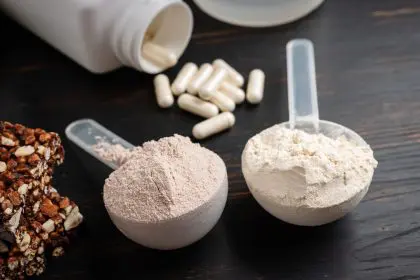In an age where processed foods dominate our plates, meeting daily fiber requirements has become increasingly challenging. The USDA’s sobering statistics reveal that over 90% of Americans fall short of their recommended 28-gram daily fiber intake. While whole foods remain the gold standard for fiber consumption, supplements like Benefiber and Metamucil have emerged as popular solutions to bridge this nutritional gap.
The consequences of inadequate fiber intake extend beyond digestive health, affecting everything from cardiovascular wellness to immune system function. Understanding these implications helps explain why fiber supplementation has become increasingly important in modern health management.
1. Breaking down the basics
The fundamental difference between these supplements lies in their active ingredients. Benefiber utilizes wheat dextrin, a non-viscous soluble fiber that dissolves clearly in liquids without forming a gel. Meanwhile, Metamucil’s star ingredient is psyllium husk, a viscous soluble fiber that creates a gel-like consistency when mixed with water.
This distinction in physical properties leads to different experiences for users. Benefiber’s clear-mixing formula makes it easier to incorporate into beverages without affecting texture, while Metamucil’s gel-forming properties may require some adjustment for new users.
2. The science behind gut health
When it comes to digestive health, these supplements work in distinctly different ways. Metamucil’s psyllium husk acts as a gentle yet effective bulk-forming laxative, promoting regular bowel movements through its gel-forming properties. The gel helps regulate intestinal muscle contractions, making it particularly effective for both constipation and diarrhea management.
Benefiber’s wheat dextrin, while not as effective for immediate bowel regulation, serves as a prebiotic fiber that supports the growth of beneficial gut bacteria. This long-term approach to gut health can contribute to improved digestive function over time.
3. Blood sugar regulation benefits
Research has shown significant differences in how these supplements affect blood sugar levels. Metamucil’s psyllium husk has demonstrated impressive results in blood sugar management, particularly beneficial for individuals with type 2 diabetes. Clinical studies have documented improvements in both fasting blood sugar and A1c levels with regular psyllium intake.
The mechanism behind this blood sugar control involves the gel-forming properties of psyllium, which can slow down the absorption of sugars in the digestive tract. This moderation of sugar absorption helps prevent rapid spikes in blood glucose levels.
4. Impact on heart health
Cardiovascular benefits represent another area where these supplements differ significantly. Metamucil’s psyllium husk has shown remarkable ability to bind with cholesterol in the digestive tract, effectively preventing its absorption into the bloodstream. This cholesterol-lowering effect is well-documented through multiple clinical studies.
Research indicates that regular psyllium intake can lower both total cholesterol and LDL (bad) cholesterol levels without affecting HDL (good) cholesterol. This selective effect makes it particularly valuable for cardiovascular health management.
5. Weight management potential
Both supplements may contribute to weight management, but through different mechanisms. Metamucil’s gel-forming properties create a pronounced feeling of fullness, potentially reducing overall calorie intake. While Benefiber might contribute to satiety, its effects on weight management are less well-documented.
The satiety effect of psyllium can last several hours, making it particularly useful for managing between-meal snacking. This prolonged feeling of fullness can support portion control and reduced calorie intake without feeling deprived.
6. Understanding dosage and safety
Proper dosing is crucial for maximizing benefits while minimizing potential side effects. Starting gradually allows your body to adjust to increased fiber intake, reducing the likelihood of digestive discomfort. Both supplements require consistent water intake for optimal effectiveness and safety.
These supplements can interact with various medications by affecting their absorption rates. Understanding these interactions is crucial for anyone taking regular medications, particularly those for diabetes, heart conditions, or thyroid disorders. Generally, it’s recommended to separate fiber supplement intake from other medications by at least two hours to prevent interference with absorption.
While both supplements are generally considered safe, they’re not without potential side effects. Common issues include bloating, gas, and abdominal discomfort, particularly when starting supplementation or exceeding recommended doses. Certain individuals, such as those with swallowing difficulties or intestinal blockages, should exercise caution or avoid these supplements altogether.
Making an informed choice
Your specific health goals should guide your choice between these supplements. Consider your digestive support needs, blood sugar management goals, cardiovascular health concerns, and any potential medication interactions. Personal preferences regarding texture and budget considerations also play important roles in the decision-making process.
While supplements can help bridge the fiber gap, they shouldn’t replace whole food sources entirely. A balanced approach combining whole foods with appropriate supplementation often yields the best results. Natural sources of fiber offer additional benefits through their complex matrix of nutrients, including vitamins, minerals, and antioxidants.
Ongoing research continues to reveal new benefits and applications for different types of fiber supplements, particularly in areas such as gut microbiome diversity, immune system function, and inflammatory responses. These developments may lead to more targeted recommendations for specific health conditions and personalized supplementation approaches.
















